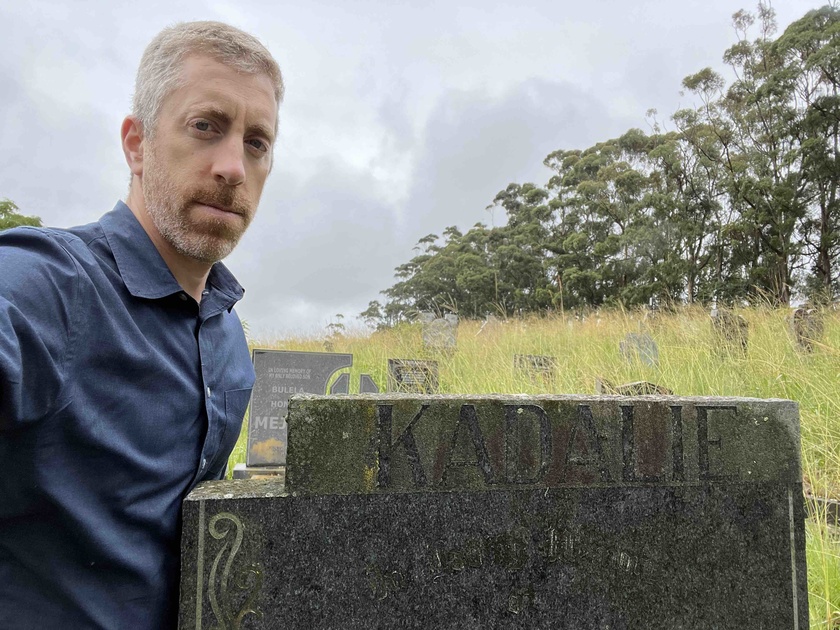(Note: this post is open to all; please consider becoming a subscriber to my Locals site.)
On Sunday morning, I woke early to catch a flight at dawn to East London, in the Eastern Cape, where the great Clements Kadalie, the first black trade union activist in South Africa (and my wife's great-grandfather), lived out his life after his career in organizing came to an end. He is buried there, in the Cambridge Cemetery, and I wanted to visit his grave and pay my respects.
I did not know exactly where his grave was, but thanks to photos posted in recent years to Facebook by other people, including the local municipal government -- which held a ceremony there last year with the president of Malawi, where Kadalie was from -- I had some visual and geographic clues.
On my way to the cemetery, I stopped in the center of the city to visit the statue of Steve Biko, the founder of the Black Consciousness movement, who was killed by apartheid police. East London was his hometown, as it was for many intellectual leaders of the struggle.
After driving around the cemetery alone in a drizzling rain -- the Eastern Cape and Western Cape had dramatically different weather yesterday -- I found the area where I believed his grave was likely to be. As I stepped out of my car, I felt Kadalie's presence. I knew I would find his grave. And soon, among the overgrown grasses -- there it was. The rain ceased, and the sky grew lighter.
After saying a prayer, and reflecting on the life of the great man, I left and drove down to the coast, where I walked along a beach for half an hour. East London is a gritty port city, where the poverty of the townships is grinding, and the roads are full of potholes. But like much of the Eastern Cape, it is known for its magnificent beaches, and I enjoyed a stroll, watching the wild waves of the Indian Ocean underneath overcast skies, and collecting some seashells.
I returned to the King Phalo Airport and boarded a flight back to Cape Town. I was one of the only white people aboard; evidently many black people with the means to do so are choosing to fly back and forth between the Eastern Cape and the Western Cape rather than taking the dangerous long-distance taxis.
I joined family for a hike through the Kirstenbosch National Gardens on a scorching yet beautiful afternoon. There is nothing quite like the glory of the gardens, which nestle up against the windward side of Table Montain, beneath a formation called Table Rock. We explored a new walkway that rises through the treetops, and the familiar site of Colonel Bird's Bath, a brick pool that is more than 200 years old and is fed by a natural spring from within the mountain. As evening settled, a crowd gathered on the lawn for an outdoor movie -- an innovation in the era of COVID that may also become a cherished tradition.
This week’s portion launches the great story of Abraham, who is told to leave everything of his life behind — except his immediate family — and to leave for “the Land that I shall show you.”
There’s something interesting in the fact that Abraham is told to leave his father’s house, as if breaking away from his father’s life — but his father, in fact, began the journey, moving from Ur to Haran (in last week’s portion). His father set a positive example — why should Abraham leave him?
Some obvious answers suggest themselves — adulthood, needing to make one’s own choices, his father not going far enough, etc.
But I think there is another answer. Abraham (known for the moment as Abram) needs to establish his own household. This is not just about making one’s own choice, but really about choosing one’s own starting point. It’s starting over.
Sometimes we start over in fundamental ways even if much that surrounds us remains the same. Sometimes the journey we have to ...
The story of Noah is familiar; the details, less so.
Noah is often seen as an ambivalent figure. He was righteous -- but only for his generation. What was his deficiency?
One answer suggests itself: knowing that the world was about to be flooded, he built an Ark for the animals and for his own family -- but did not try to save anyone else or to convince them to repent and change their ways (the prophet Jonah, later, would share that reluctance).
Abraham, later, would set himself apart by arguing with God -- with the Lord Himself! -- against the destruction of Sodom and Gomorrah, saying that they should be saved if there were enough righteous people to be found (there were not).
Still, Noah was good enough -- and sometimes, that really is sufficient to save the world. We don't need heroes every time -- just ordinary decency.
Hi all -- as I noted last month, I'm going to be closing down my Locals page, at least for tips and subscriptions -- I may keep the page up and the posts as well, but I'm no longer going to be accepting any kind of payment.
Look for cancelation in the very near future. Thank you for your support!



















